Love: The Greatest Marketing Trick of All Time
The secret of marketing is to sell something by using an incentive one will not recognise. This is often quite easy to accomplish. Most of us hardly ever know what we want until one shows it to us. Love has a much similar story to tell.
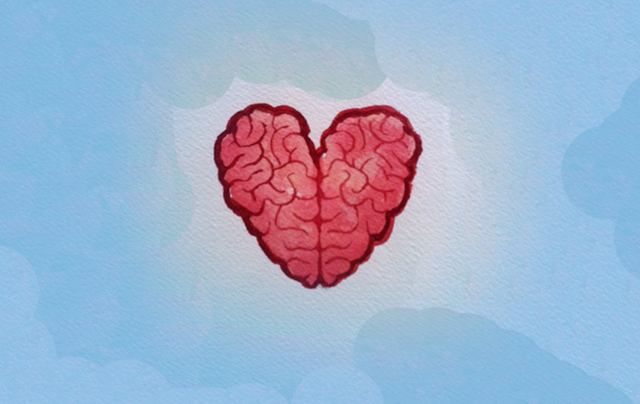
A Curious Experiment
In 2008 the biological anthropologist Helen Fisher presented an interesting experiment. Using an MRI machine she scanned the brains of four groups of people. The first group were people who had just fallen in love while the second included people that had been recently heartbroken. The third group was comprised of individuals who had just started using cocaine, and the fourth ones withdrawing from the habit.
The MRI readings for those falling in love and those getting into cocaine were strikingly similar. Same thing applied for people who were withdrawing from cocaine or falling out of love. The overall readings of people under the effects of love and under the effects of cocaine were indistinguishable when visually compared side by side.
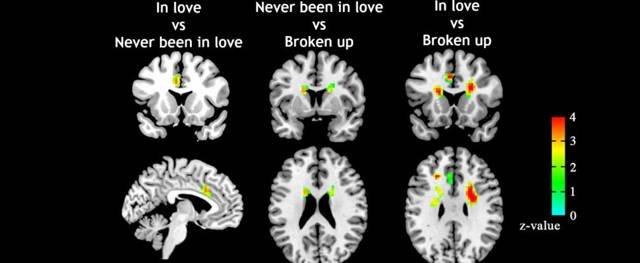
According to the experiment report, not a single spark of MRI activity was flaring from the frontal lobe—the part of the brain where feelings are processed. Instead, the readings indicated similarities to a disease, an illness—a series of biochemical reactions that trigger an emotional cascade, impairing normal functioning. Being addicted to drugs, being sick or being in love turns out to be much the same and we can all vouche for this. Belly aches, overactive sweat glands, nervousness, paranoia, insecurity, obsessions, delusions; the parallels are pretty much identical. Surprisingly enough, after one has sexual intercourse the ...condition dissipates. Nature has tricked us once again and sold us love by hijiking the brain much like a drug does.
There is no evidence that “love” is an emotion, other than the romantic story we promised to tell to each other until we forget that it's a lie. Romantic love is a recent cultural invention, no more than 300 years old. It picked during the era of Romanticism (1800-1850) as a reaction to Renaissance and carried on until recently with the manifestation of the romantic notion of the nuclear family. People back in the day used to get married for business and have sex for fun.
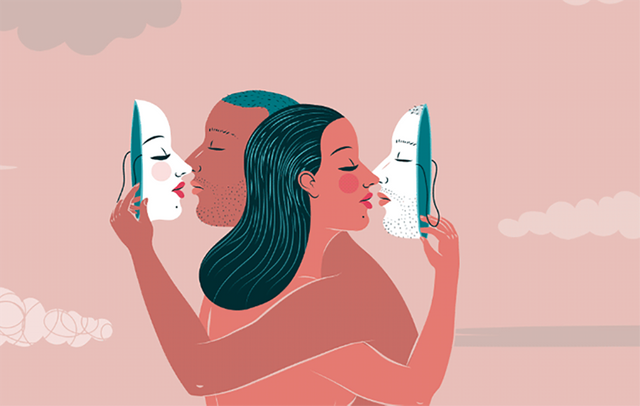
“No, that’s not love, you see...."
People pontificate, "Love can save us all." Religious leaders use it as a medium for their own God's intentions. Politicians summon it for state cohesion. Families promote it in order to foster clan solidarity. Lovers throw it to the face of each other for reassurance. Love is marketed more than anything else around us.
Nonetheless, love has nothing to do with any of the above. It is not the end product being sold but rather a means to promote other ideas. It has nothing to do with world peace, emotion or spirituality. Quite the contrary. The majority of violence in our species occurs because we “love” something rather than something else. We segregate, ignore and attack each other because we wish to market our version of love over another. We dispose of individuals and concepts because the idea of love is volatile with time. It degrades only to flourish somewhere else.
Love, as a marketable idea, is the problem for most of humanity’s turmoils, not the solution as it is so often advertised to be. It can define us as human beings but can also easily destroy us. Leaders, lovers and entrepreneurs know this very well. We all use the term so extensively that it has indeed become the greatest marketing trick of all time. Throw the word “love” in any context and the meaning of one’s message magically transforms.

The 3 Stooges of Procreation
People perceive love quite differently based on their socio-cultural upbringing. We first evaluate the cultural default of the concept and then try to distill a private version based on our selfish interests. It is much like the perception of a supernatural being, a God for which everyone has developed a private heresy, a buffet of beliefs, according to one’s moral convenience.Nonetheless we seem to agree more or less in 3 allegorical, as they turn out to be, categories. These 3 domains are relatively similar. The only thing changing in each case is the narrative we apply to each situation. All 3 domains fall under a selfishly altruistic stance which I explain in detail here;
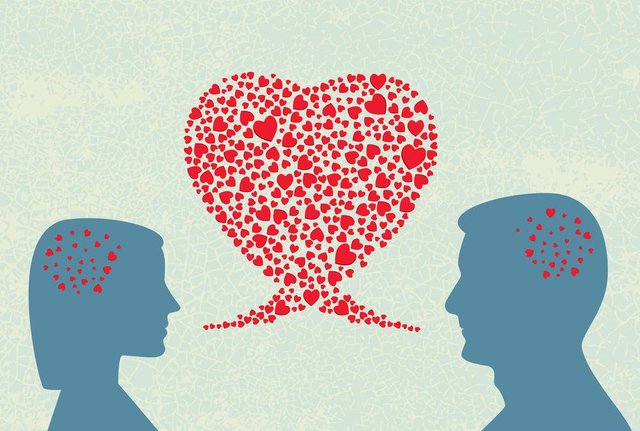
1. Romantic Love is what we experience with sexual desire. Don’t let the sophists fool you. The difference between love and sex is about 15 to 20 minutes. We use romantic love to camouflage our lust and desire in order to facilitate procreation. Ask yourself. How much would you “love” your partner if they had different or no sexual organs?
We love sexually because we want to propagate our own genes. It's that simple. We are selfish about the idea of love as much as we are about having our own kids instead of adopting ones that starve to death. We love ourselves so much that we want to live forever through passing our genes to others. Human procreation is no different than a quest for immortality. This is why you see so many parents pushing their children to become what they themselves have fallen short of. Evolution has planned to make us better and better, much like the rest of the animal kingdom.
2. Affection between friends is our second promo marketer for love. It is what binds a group together. People become friends to benefit from one another in business, social affairs or intellectual endeavours. No brainer here. Affection between friends can create social and economic status that also facilitates romantic love. This also solves the mystery in regards to “why your friends vanish once they get a lover”. The friendship circle has fulfilled its purpose. Of course the group still gets together from time to time but it is never the same. Another inner group, the family, is forming through romantic love. No time to waste.
3. Parental love is a selfishly altruistic stance to benefit one’s group by promoting one’s genes. Parents will often sacrifice themselves to save their offspring. This occurs due to the sake of favouring evolutionary fitness within one's kin. Almost all animals hold the same attitude. Nothing magical about this either. Parental love is nature’s safe switch for bringing up the offspring. This is also why the child mostly resembles the father when young —so the provider can stay close while the mother recovers from birth. It also explains why females often go for male qualities such as being a good provider, artistic or physically fit. The provider can supply the mother while in labour and thereafter. The artistic type is often sensitive thus it will cater for the child longterm. The physically fit can protect the family. If you wondered why the men are not so selective with sexual partners while women are extra picky, well, now you know. Men can spread the seed carelessly. Women have to choose carefully because they are going to be stuck with the child. Back in the day many women died at birth, so a cautious selection was a necessity . As a female you had to choose once, and choose carefully.
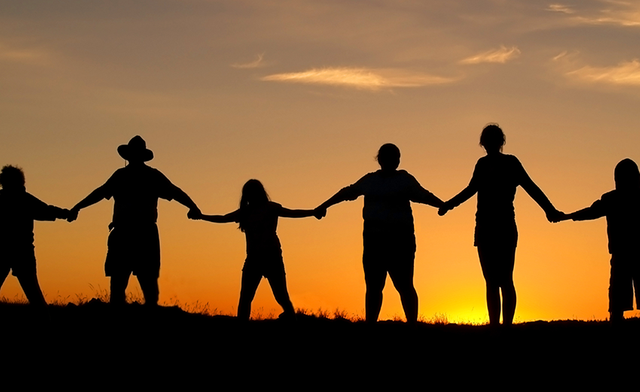
A Cultural Imperative
Love exists because we hold dear of specific attributes about human nature. In Ayn Rand's words, we love what has a virtue. Virtues are not and cannot be universal since we are all unique entities.
We never really love somebody but rather the idea we create towards them. An idea constructed from our own perspective, our own desires. At the end, we love ourselves. This naked truth is rarely accepted because we all need to be loved as our culture has dictated to us. The concept of love is so culturally pervasive it has become an obligation, whether one loves a movie, their country, or a lover—even if the idea can be shattered in an instance.
When it comes to romantic love and sex we seek our own pleasure through the use of another human being. Our own ideals and desires operate as a tool for pleasuring oneself—no different than masturbation—and what is self-pleasuring other than our own manifestation of what we call love?
People express love towards their religion, often chosen because it's a religion of love (as if there was a religion of hate). Another individual from a different religion feels much the same about their own. The two often collide because this is not about love but rather the narrative of love one gives to support their own religion. A young man falls in love with a girl while another feels much the same about another. In all cases, what we call “love” is merely a manifestation of selfishness towards our own desires, culture and archetypes. We bullshit ourselves into glorifying the idea because our environment demands it. If we had to accept that love is just a meme we invented, we would have to accept we are just brutes—and we are.
A three-day fling of a thirteen- and a seventeen-year-old resulted in six tragic deaths. This is the story of Romeo & Juliet, glorified, even if it is such an atrocious act. It doesn't get more depressing than this— all for “love's” sake? The story merely reflects the absurdity of the idea of love but it is a hallmark in human history, a potrait of the concept. Almost the entirety of the last two centuries revolves around this idea of sacrifice and suffering as means for attaining “love”. Religions use it as much as lovers. We have managed to bind nature’s raw autopilot into a glorified masochistic narrative. Truly a facepalm of colossal magnitude.
One has to ask oneself: In a world where everybody is in love with something, how the heck do we end up with so much violence and hatred but still asking for more? If “love” was what we claim to be “missing” how do we excuse what is happening around us, in our countries, our relationships and our social circles?
We need to understand and accept that what we call “love” is an urge, an innate instinct that has to do with survival and procreation rather than a romantic fable. No matter how much we like to dress it up with in fancy narratives, the truth is always there, staring back at us. Love is the greatest marketing trick of all time, and nature is the promoter.
___
@kyriacos
Good post. Great catch on the Renaissance "romanticism" that altered people's perception to create a new image of "love" in our consciousness. I have also mentioned that in some of my own work (not on steemit).
"Love" can indeed be blind. But as you explain, it's not really "love", hehe. It's more accurate for people to say infatuation with our desires, it becomes more correlated with attachment through desire. The term "love" has been diluted in meaning these days to mean so many things. The biochemical aspect of infatuation is referred to as "love", but its not the deeper love of "philos" or "storge" that can be had through mutual respect and admiration of others that extends beyond personal sexual relationships and won't be extinguished simply because we get infatuated with the romantic personal variant or the duty of parenthood variant.
Today, we do use the word "love" to sell so much. We use "love" as a term to refer to things we like, and what other people like, which is often referring to commercial products and activities. I "love this". You "love" that. And there is a commercialized day to sell "love" called Valentine's Day where YOU MUST obey to buy things for the woman... LOL. TO be fair, it is indeed harder for women in the sexual and parenting dimension, as they do usually bear the brunt of the responsibility for raising children in their belly and afterwards.
But there is a valid use for the word, once it can be understood for what it should refer to in reference to reality. There is something to trace the word back to in reality, if we want to find it.
Are you familiar with "The Four Loves" or the "6 Love Styles"? I am not saying these are that specific original definition, but they are other variants that describe parts of our reality. So I don't agree with "If we had to accept that love is just a meme we invented, we would have to accept we are just brutes—and we are." There is a reflection from reality that creates word symbols to begin with. That is their purpose.
I will put a link to my site about how "Truth is Love, Love is Truth", for any who wish to read. But it was written a while ago and has some woowoo concepts I was influenced with at the time tied into it. Despite that, there is still valid material to be gained from understanding the supremacy of truth as the highest form of love. Truth, non-contradiction, the basis for understanding and communicating about reality.
Take care. Peace.
Hi @krnel
Always appreciate your comments. I am well aware of the 4 kinds of love used mostly in ancient Greece under that specific socio-cultural context. I am a Cypriot myself and Greek is my nativ language ( i also studied ancient greek). Those words that you mentioned, today, have completely different meanings— and we are not even sure how they were used in the past. For example ancient greeks demonstrated philia(eros+love) toward their students. our ethical code today does not accept this thus the meaning along with the words shifted.
This brings us again, back to our last discussion about"egoism/selfishness/egotism". Language is a very powerful but also diverse tool. I am not bothered with it so much because it is massively subjective and interpetive. As an anthropologist I rather strip culture into the biology of who we are. This is why I did not mention the 4 kinds of love you mention. There is no reason. There is no magic formula into understanding "love". it was bullshit back in ancient greece, still bullshit today.
In ancient Greece they were not even referred to as "love". Storge, spelled Storgi(Στοργή) is only used from mothers toward their children in order to demonstrate "taking care of someone with love". it has nothing to do with what wikipedia refers. 'pragma' means simply "thing" . mania means "obsession/manic". The words you see and probably taken from wikipedia; they are contextual to poetry and special refferals that some greeks under specific schools of thought had and propegated.
Language is a tool but not a tool that can bring people together. quite the opposite i must say. People meet "in between the lines" through various forms of communication. more is not better. this is also why today with so much technology, being connected than ever through so much media, we are still very much alienated and hard to get each other.
the more you add to somehing (words/meanings) the more entropic it gets.
Summary by @tldr:
According to the experiment report, not a single spark of MRI activity was flaring from the frontal lobe--the part of the brain where feelings are processed.
 image credit The 3 Stooges of Procreation People perceive love quite differently based on their socio-cultural upbringing.
image credit The 3 Stooges of Procreation People perceive love quite differently based on their socio-cultural upbringing.
 image credit A Cultural Imperative Love exists because we hold dear of specific attributes about human nature.
image credit A Cultural Imperative Love exists because we hold dear of specific attributes about human nature.
Instead, the readings indicated similarities to a disease, an illness--a series of biochemical reactions that trigger an emotional cascade, impairing normal functioning.
Belly aches, overactive sweat glands, nervousness, paranoia, insecurity, obsessions, delusions; the parallels are pretty much identical.
It picked during the era of Romanticism (1800-1850) as a reaction to Renaissance and carried on until recently with the manifestation of the romantic notion of the nuclear family.
It is much like the perception of a supernatural being, a God for which everyone has developed a private heresy, a buffet of beliefs, according to one's moral convenience.
stats: 10.0% of original contents - learn more
this is what I'm talking about. chemical manipulation!
Now that's a badass band name @cristi
This is an excellent post, probably one of the best 10 I have read
CONGRATULATIONS
and I hope this gets rewarded
@smooth
proofreading "even if the idea can be shattered in an instance"
I think you meant instant
proofreading "how the heck do we end end up with so much violence"
end typed two times
This is a really interesting post. "There is no evidence love is an emotion". Whoa! New age spiritualists are firm that love is THE answer. To love one another, one self, and all parts of the universe. Now with this information, it really puts a different spin on things.
If anyone asks around @mahma they will soon find out that love is already here, too much of it. The point is that we need to get in touch with reality rather than what we want to believe is true
Reality has such a hazy definition, especially because no matter how subjective we attempt to be, we cannot conpletely eliminate our experiences and beleifs- which will affect everything. Sure we can change our beleifs, but regardless, each of us will view a situation different because of the unique experience we have had so far in life.
There is some top5 material for me... cheers kyriacos. see you on my tommorow post.
Another great article - you explain the main points very well. I think the cocaine/MRI experiment is probably well known by most people because it got a lot of press attention some years ago.
My favourite quote is:
Unfortunately I don't think people will like it though and I understand why. We have to tell ourselves certain things in order to make life easier to live.
The traditional idea of love is so tightly ingrained in all human cultures (at least the modern ones) that breaking it down to it's root motivations is something that would be a source of extreme dissonance to most people - to the point of being irreconcilable with their egos.
Whilst you have dissected it very well I feel that this information will be ultimately unpalatable for most tastes particularly on here where "feel-good" type of material is what tends to be appreciated.
That is sad and I hope it doesn't dishearten you as it is appreciated by some of us.
@theycryptofiend
I was aware how people would take it. I never aim to "attract" people with my articles. My writing does not depend on my audience's desires. That would be plain "whoring" of my mind. Some things are hard to brake because people depend on them so much. Most have built their entire lives around these concepts.
This post has been linked to from another place on Steem.
Learn more about linkback bot v0.3
Upvote if you want the bot to continue posting linkbacks for your posts. Flag if otherwise. Built by @ontofractal